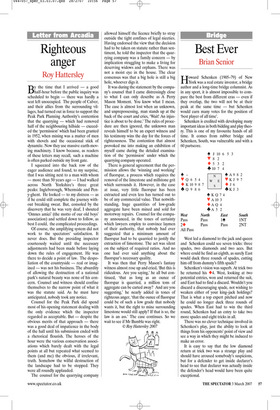Righteous anger
Roy Hattersley
By the time that I arrived — a good half-hour before the public inquiry was scheduled to begin — there was hardly a seat left unoccupied. The people of Calver, and their allies from the surrounding villages, had turned out in force to support the Peak Park Planning Authority’s contention that the quarrying — which had removed half of the neighbouring hillside — exceeded the ‘permission’ which had been granted in 1952, when mining was a matter of men with shovels and the occasional stick of dynamite. Now they use massive earth-moving machinery. I know because, as readers of these letters may recall, such a machine is often parked outside my front gate.
I squeezed into the back row of the eager audience and found, to my surprise, that I was sitting next to a man with whom — more than 50 years ago — I had walked across North Yorkshire’s three great peaks: Ingleborough, Whernside and Peny-ghent. He looked — to my distress — as if he could still complete the journey without breaking sweat. But, consoled by the discovery that he was very deaf, I shouted ‘Omnes amici’ (the motto of our old boys’ association) and settled down to follow, as best I could, the complicated proceedings.
Of course, the amplifying system did not work to the spectators’ satisfaction. It never does. But the presiding inspector courteously waited until the necessary adjustments had been made before laying down the rules of engagement. He was there to decide a point of law. The despoliation of the countryside — real or imagined — was not his business. The absurdity of allowing the destruction of a national park’s natural beauty was none of his concern. Counsel and witness should confine themselves to the narrow point of what it was the statute said. As he must have anticipated, nobody took any notice.
Counsel for the Peak Park did spend most of his opening statement dealing with the only evidence which the inspector regarded as acceptable. But — despite the obvious merits of that approach — there was a good deal of impatience in the body of the hall until his submission ended with a rhetorical flourish. The heroes of the hour were the various conservation associations which barely dealt with the legal points at all but repeated what seemed to them (and me) the obvious, if irrelevant, truth. Somehow the wilful destruction of the landscape had to be stopped. They were all roundly applauded.
The counsel for the quarrying company allowed himself the licence briefly to stray outside the tight confines of legal niceties. Having endorsed the view that the decision had to be taken on statute rather than sentiment, he told the inspector that the quarrying company was a family concern — by implication struggling to make a living for deserving widows and orphans. There was not a moist eye in the house. The clear consensus was that a big hole is still a big hole, whoever digs it.
It was during the statement by the company’s counsel that I came distressingly close to what I can only describe as A Perry Mason Moment. You know what I mean. The case is almost lost when an unknown, and unprepossessing, man stands up at the back of the court and cries, ‘Wait! An injustice is about to be done.’ The rules of procedure are then ignored, the unknown man reveals himself to be an expert witness and his testimony wins the day for the forces of righteousness. The contention that almost provoked me into making an exhibition of myself came during the detailed examination of the ‘permission’ under which the quarrying company operated.
There is general agreement that the permission allows the ‘winning and working’ of fluorspar, a process which requires the removal of the limestone and millstone grit which surrounds it. However, in the case at issue, very little fluorspar has been extracted and even less has turned out to be of any commercial value. That notwithstanding, huge quantities of low-grade aggregate have been mined and sold for motorway repairs. Counsel for the company announced, in the tones of certainty which lawyers employ to convince laymen of their authority, that nobody had ever suggested that a minimum amount of fluorspar had to be quarried to justify the extraction of limestone. The act was silent on the subject of required ratios. And no one had ever said anything about the fluorspar’s necessary quality.
It was then that Perry Mason’s fantasy witness almost rose up and cried, ‘But this is ridiculous. Are you saying,’ he all but continued, ‘that as long as an ounce of fluorspar is quarried, a million tons of aggregate can be carted away? And are you suggesting,’ he nearly added in tones of righteous anger, ‘that the ounce of fluorspar could be of such a low grade that nobody wants it, but the right to mine surrounding limestone would still apply? If that is so, the law is an ass.’ The case continues. So we wait to see if Mr Bumble was right.
© Roy Hattersley 2007










































































 Previous page
Previous page